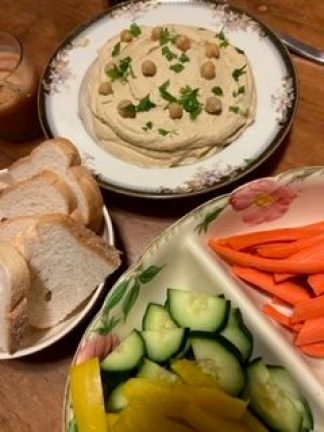
Laurie Colwin wrote memorable, funny novels (Happy All the Time, Family Happiness); ironic, pithy short stories (The Lone Pilgrim and other collections); and two volumes of essays about food: Home Cooking: A Writer in the Kitchen and More Home Cooking: A Writer Returns to the Kitchen, derived from her long-running column in Gourmet magazine. She died of a brain aneurysm at the age of 48 in 1992.
Lots of readers came to Laurie Colwin through her food writing. I discovered her food writing in the opposite direction, loving her fiction first. My copy of Home Cooking, a 1990 birthday gift, is now tattered and stained, mostly because of “How to Make Gingerbread,” which I reread every Christmas season. Colwin is writing about actual cake, not gingerbread cookies, as this introductory paragraph makes clear.
I love gingerbread in its true cake form—moist, spongy, and spicy. It is strictly home food, but no one makes it anymore. . .Gingerbread made from scratch takes very little time and gives back tenfold what you put into it. Baking gingerbread perfumes a house as nothing else. It is good eaten warm or cool, iced or plain. It improves with age, should you be lucky or restrained enough to keep any around.
A simple dessert that perfumes your house and improves with age? A generous tablespoon of ground ginger in a nine-inch cake? I had to try it, and now Colwin’s gingerbread is a regular part of our holidays.
I have not yet included the molasses she recommends, Steen’s Pure Ribbon Cane Syrup, which is available online. I will try to acquire by next fall. “You do not need Steen’s to make gingerbread,” Colwin writes, “but I see it as one of life’s greatest delights, a cheap luxury.” Looking forward to next year.
Here is the bare-bones recipe, shorn of Colwin’s delicious description, as shared in the New York Times, but do yourself a favor and check out Home Cooking from the library. Whether you cook or not, you’ll have a delightful reading experience. And then pick up her fiction.
The lovely bow on my gingerbread above is courtesy of Martha Stewart, who tells us how to do it, as she does with so many things. My stencil on a cake or brownies doesn’t exactly impress my friends and family. It makes them smile, because it doesn’t seem like something I would (could) actually do. If I can do it, anyone can!
The holidays aren’t over yet! What are your favorite kitchen creations?









